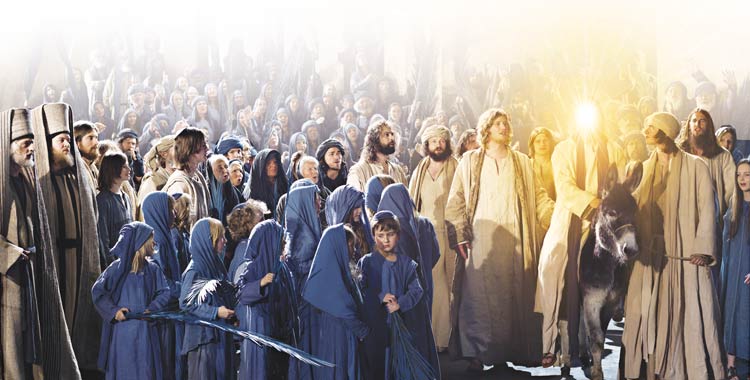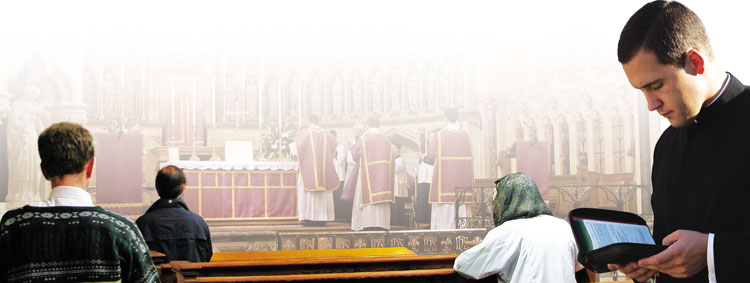Bigotry: The Dark Danger
Christians Must Heed Jesus

DOWNLOAD THE BOOK
CHAPTERS OF THE BOOK
- Foreword: Christians must heed Jesus the Messiah
- Introduction: Christianity is actually a monotheistic faith
- Chapter 1: According to historical sources, the gospel has been corrupted over time
- Chapter 2: The error of the trinity
- Chapter 3: The error that Jesus (pbuh) was crucified
- Chapter 4: Christian errors on the subject of fear and love of God
- Chapter 5: The error that those who believe Jesus (pbuh) to be divine will go to paradise
- Chapter 6: Some Christians’ error regarding Armageddon
- Chapter 7: The errors in the attitudes of some Christians toward Muslims
- Chapter 8: Jesus (pbuh) has come
- Chapter 9: The danger in some Evangelicals’ ideas about the antichrist
- Appendix: The Deception of Evolution
< <
5 / total: 12
Chapter 3: The Error That Jesus (pbuh) as CrucifiedVarious Contradictions in the Four Gospels About the Idea of the Prophet Jesus' (pbuh) Supposed CrucifixionAfter it was modified, Christian faith is now based on the belief that the Prophet Jesus (pbuh) was crucified and killed on the cross and that he was then resurrected. However this information does not reflect the truth. As revealed in the Koran in detail, Jesus was not crucified, and was therefore not killed. On the contrary, he was raised to the heavens while still alive and taken into the Sight of God to be sent back to Earth again in the End Times. The reason for the Christian community defending the belief that Jesus was crucified lies in some contradictory explanations written in some chapters in the Gospel. However, the statements written in the chapters in question are, as we have stated before, contradictory ones, which were added to the Gospel after Jesus (pbuh), in the 3rd Century. The four Gospels contain differences regarding the supposed crucifixion of Jesus and what happened immediately before and after. Let us look at these contradictory accounts in the Gospels: Contradictory Statements in the Gospels About Jesus' (pbuh) Supposed Crucifixion
Who carried the cross?There are statements in Mark 15:21, Matthew 27:32 and Luke 23:26 that the cross was carried by Simon of Cyrene: As they were going out, they met a man from Cyrene, named Simon, and they forced him to carry the cross. (Matthew 27:32)
The Gospel of John states that Jesus (pbuh) carried the cross himself: Carrying his own cross, he went out to the place of the Skull (which in Aramaic is called Golgotha). (John 19:17)
The crucified thieves:Sections of Mark 15:27-28, Matthew 27:44 and Luke 23:39-42 say that Jesus was supposedly crucified along with two thieves. The inconsistency here is that the Romans never crucified thieves; historically, the punishment of crucifixion was reserved for those in rebellion to the Roman Empire. They crucified two robbers with him, one on his right and one on his left. (Mark 15:27-28) In the same way the robbers who were crucified with him also heaped insults on him. (Matthew 27:44) Contradictory information about the time of Jesus' (pbuh) supposed crucifixion:In the relevant passages from Mark 15:25, Matthew 27:45-46, Luke 23:44-46 and John 19:14-15 the time of Jesus' (pbuh) supposed crucifixion differs from one another. It was nine in the morning when they crucified him.(Mark 15:25) It was now about noon, and darkness came over the whole land until three in the afternoon, for the sun stopped shining. And the curtain of the temple was torn in two. Jesus called out with a loud voice, "My Lord, into Your hands I commit my spirit." When he had said this, he breathed his last. (Luke 23:44-46) The so-called last words of Jesus (pbuh):
There is also contradictory information in the four Gospels about the last words of Jesus (pbuh) during his supposed crucifixion. Mark 15:34-37 and Matthew 27:46-50 say that Jesus (pbuh) called out: And at the ninth hour Jesus cried out in a loud voice, "Eloi, Eloi, lama sabachthani?"—which means, "My God, my God, why have You forsaken me? [God is beyond that.]" (Mark 15:34)
In the Gospel of Luke, the supposed last words of Jesus (pbuh) are cited differently: Jesus called out with a loud voice, "God, into Your hands I commit my spirit." When he had said this, he breathed his last. (Luke 23:46)
In the Gospel of John, the statements on this subject are completely different: When he had received the drink, Jesus said, "It is finished." With that, he bowed his head and gave up his spirit. (John 19:30)
The earthquake during the supposed burial of Jesus (pbuh):This account comes from the Gospel of Matthew: At that moment the curtain of the temple was torn in two from top to bottom. The Earth shook and the rocks split. The tombs broke open and the bodies of many holy people who had died were raised to life. They came out of the tombs, and after Jesus' resurrection they went into the holy city and appeared to many people. (Matthew 27:51-53)
In the Gospels of Mark, Luke and John, there are several descriptions of the supposed burial of Jesus (pbuh). However, no mention is made of an earthquake, which is impossible to have been forgotten if such an earthquake had ever occurred. Events that took place following the supposed burial of Jesus (pbuh):Events alleged to have taken place following the supposed burial of Jesus (pbuh) are described differently in the four Gospels: At that moment the curtain of the temple was torn in two from top to bottom. The Earth shook and the rocks split. The tombs broke open and the bodies of many holy people who had died were raised to life. They came out of the tombs, and after Jesus' resurrection they went into the holy city and appeared to many people. (Matthew 27:51-53) But when they looked up, they saw that the stone, which was very large, had been rolled away. As they entered the tomb, they saw a young man dressed in a white robe sitting on the right side, and they were alarmed. (Mark 16:4-5) They found the stone rolled away from the tomb, but when they entered, they did not find the body of ... Jesus. While they were wondering about this, suddenly two men in clothes that gleamed like lightning stood beside them. (Luke 24:2-4) So Peter and the other disciple started for the tomb. Both were running, but the other disciple outran Peter and reached the tomb first. He bent over and looked in at the strips of linen lying there but did not go in. Then Simon Peter, who was behind him, arrived and went into the tomb. He saw the strips of linen lying there, as well as the burial cloth that had been around Jesus' head. The cloth was folded up by itself, separate from the linen. (John 20:3-8) The competent authorities to which Jesus (pbuh) was supposedly taken are described differently:
In the Gospels of Mark 14:53, Matthew 26:57 and Luke 22:54, the competent authority to which Jesus was taken is described as Caiaphas, the high priest. But in the Gospel of John it is Annas, the father-in-law of Caiaphas. They took Jesus to the high priest...(Mark 14:53) Those who had arrested Jesus took him to Caiaphas, the high priest... (Matthew 26:57) Then seizing him, they led him away and took him into the house of the high priest. Peter followed at a distance. (Luke 22:54) ... and brought him first to Annas, who was the father-in-law of Caiaphas, the high priest that year. (John 18:13) Jesus (pbuh) supposedly standing trial over accusations:In the four Gospels, all of the descriptions of the supposed trial of Jesus contradict one another. According to the Gospel of John, only the high priest interrogates Jesus: Then the detachment of soldiers with its commander and the Jewish officials arrested Jesus. They bound him and brought him first to Annas, who was the father-in-law of Caiaphas, the high priest that year. Caiaphas was the one who had advised the Jews that it would be good if one man died for the people... Meanwhile, the high priest questioned Jesus about his disciples and his teaching. (John 18:12-14,19)
According to the Gospels of Mark, Luke and Matthew, Jesus is tried by the whole of the High Council: At daybreak the council of the elders of the people, both the chief priests and teachers of the law, met together, and Jesus was led before them. "If you are the Christ," they said, "tell us." (Luke 22:66-67) They took Jesus to the high priest, and all the chief priests, elders and teachers of the law came together... The chief priests and the whole Sanhedrin were looking for evidence against Jesus so that they could put him to death, but they did not find any. Many testified falsely against him, but their statements did not agree. (Mark 14:53-56) Those who had arrested Jesus took him to Caiaphas, the high priest, where the teachers of the law and the elders had assembled. But Peter followed him at a distance, right up to the courtyard of the high priest. He entered and sat down with the guards to see the outcome. The chief priests and the whole Sanhedrin were looking for false evidence against Jesus so that they could put him to death. (Matthew 26:57-59)
Jesus' (pbuh) so-called interrogation by Herod:The Gospel of Luke says that Jesus was interrogated by Herod: On hearing this, Pilate asked if the man was a Galilean. When he learned that Jesus was under Herod's jurisdiction, he sent him to Herod, who was also in Jerusalem at that time. When Herod saw Jesus, he was greatly pleased, because for a long time he had been wanting to see him. From what he had heard about him, he hoped to see him perform some miracle. He plied him with many questions, but Jesus gave him no answer. The chief priests and the teachers of the law were standing there, vehemently accusing him. Then Herod and his soldiers ridiculed and mocked him. Dressing him in an elegant robe, they sent him back to Pilate. That day Herod and Pilate became friends—before this they had been enemies. (Luke, 23:6-12)
In the Gospels of Matthew, Mark and John, the supposed interrogation of Jesus by Herod is not mentioned. The contradictions in question are open evidences that those accounts told about the supposed crucifixion of Jesus are based on completely false information and the descriptions of that moment and environment contradict one another. If Christians point to the Gospels as evidence that Jesus was killed, then they need to see that they cannot arrive at definitive and clear information from the four different versions of the canonical gospels. In order to see the truth they need to look at the Koran, which God says that He sent to confirm the Gospel. Almighty God reveals in the Koran that Jesus was not crucified, that he was definitely not killed, but that He created an environment that made unbelievers believe that it happened in that way. Our Lord reveals in the Koran that these claims about Jesus are invalid; the traps set by hypocrites and unbelievers for Jesus came to nothing, and Jesus was taken up into God's Sight. When the contradictions in the Gospel passages in question are analyzed in the light of the Koranic verses, the uncertainty between the four Gospels is immediately clarified: Jesus did not die, but a special image was shown to make people think he had been crucified. Jesus (pbuh) Did Not Die, But Was Raised Into God's SightIn the Koran God provides accurate information about the crucifixion of Jesus, which is described in the Gospel in a contradictory and doubtful manner. In the Koran, God makes it clear that plots against Jesus were thwarted and that they certainly did not kill him: ... and their saying, "We killed the Messiah, Jesus son of Mary, Messenger of God." They did not kill him and they did not crucify him but it was made to seem so to them. Those who argue about him are in doubt about it. They have no real knowledge of it, just conjecture. But they certainly did not kill him. (Koran, 4: 157) In the Koran, the fact that Jesus was not killed is stressed twice in the same verse. It says that those who advocate the belief that Jesus was killed have "no real knowledge of it, just conjecture." This is a very clear statement and one that cannot possibly be interpreted in any other way. Someone resembling Jesus (pbuh) was crucified:In the same verse in the Koran God reveals, "They did not kill him and they did not crucify him but it was made to seem so to them." (Koran, 4:157), and informs us that the person who was crucified was another person who resembled Jesus. The individual who was crucified instead of Jesus was Judas Iscariot, who betrayed Jesus. As a great miracle, God made Judas Iscariot resemble Jesus. When they came to take Jesus to crucify him, they took Judas Iscariot, who was present there, instead and crucified him. Besides, since Judas Iscariot's face was covered with blood, people did not realize that it was not Jesus who was crucified. In the latter part of the verse 157 of the 4th surah, God relates, "They have no real knowledge of it, just conjecture." Those who set the trap and those around just went along with their own misapprehensions, and as set out in the verse, they have no other knowledge of it. Indeed, in the Gospel, the last words of Jesus are given as "Elohi, Elohi, lama sabachthani?" which means, "My God, My God, why have You forsaken me?" This is a continuation of the same delusion and the expression of weakness of faith in question belongs to Judas Iscariot, whose plot was thwarted and who was crucified instead of Jesus. Indeed, it is obvious that Jesus, who was a servant of God, who wholeheartedly submitted to God and loved Him and who knew that everything comes from Him, could not have spoken these words. But one would expect such rebellious statements to come from the mouth of a hypocrite such as Judas Iscariot. The disappearance of Judas Iscariot according to the Gospels:
Parallel to what is revealed in the verses of the Koran and also supported by various sources, there are passages in the Gospels that may provide evidence that Judas Iscariot, who betrayed Jesus (pbuh), was crucified instead of him. According to these passages we need to notice that just after the crucifixion, Judas Iscariot disappeared. The authors of the Gospels tried to explain this away in various ways and contradicted one another because they did not know that Judas Iscariot had been crucified instead of Jesus. The contradictory explanations regarding the disappearance of Iscariot in the Gospels read as follows: Early in the morning, all the chief priests and the elders of the people came to the decision to put Jesus to death. They bound him, led him away and handed him over to Pilate, the governor. When Judas, who had betrayed him, saw that Jesus was condemned, he was seized with remorse and returned the thirty silver coins to the chief priests and the elders. "I have sinned," he said, "for I have betrayed innocent blood." "What is that to us?" they replied. "That's your responsibility." So Judas threw the money into the temple and left. Then he went away and hanged himself. (Matthew 27: 1-5) In those days Peter stood up among the believers and said, "Brothers, the Scripture had to be fulfilled ... through the mouth of David concerning Judas, who served as guide for those who arrested Jesus—he was one of our number and shared in this ministry." With the reward he got for his wickedness, Judas bought a field; there he fell headlong, his body burst open and all his intestines spilled out. (Acts 1: 5-18) Despite the fact that some descriptions in the Gospel contradict one another, there is consensus on the certain disappearance of Judas Iscariot just after the crucifixion. Judas Iscariot disappeared, because the person who was crucified and killed was Judas Iscariot. Judas Iscariot, who normally looked like Jesus in the physical sense, was made to appear even more like Jesus as a miracle of God. The soldiers were duly mistaken and took him to the crucifix instead of Jesus. Just before this incident, by God's command, Jesus was taken up to the heavens by angels, into the Sight of God. For that reason, the officials who came to the room at the crucifixion of Jesus found only Judas Iscariot there.
In the Koran, God says that the plot against Jesus (pbuh) was "thwarted"It is a known fact that under the leadership of Judas Iscariot, a hypocrite, unbelievers plotted against Jesus. The purpose of this plot was to kill Jesus. However, in the Koran God informs us that the plot against Jesus was thwarted. If Jesus had, in one way, died, this would mean the unbelievers' plot had worked, and this is impossible, because the promise of God is always fulfilled. That plot to kill Jesus was thwarted. Jesus did not die and was not murdered. God informs us of this as follows in the Koran: When Jesus sensed unbelief on their part, he said, "Who will be my helpers to God?" The disciples said, "We are God's helpers. We believe in God. Bear witness that we are Muslims. Our Lord, we have faith in what You have sent down and have followed the Messenger, so write us down among the witnesses." They plotted and God plotted. But God is the best of plotters. (Koran, 3: 52-54) If the plots of the unbelievers had succeeded, this would surely be related in the Koran. On the contrary, we know from the Koran that the plots against Jesus came to nothing and that he was raised into the Sight of God. It is a great blessing for sincere believers that the sly plot against Jesus (pbuh) was thwarted:Despite very clear evidence, those who insist on the claim that Jesus was killed should think wisely and re-read the Koran with an open mind and keep their minds free of any prejudices. Jesus did not die; he was honorably raised to the heavens. For a sincere Christian, it is pointless to insist on the claim that he was killed. For a Christian, it is a blessing to know and believe that Jesus did not die, that he was saved from the plots of unbelievers and that he is in our Lord's Sight. Christians who maintain this are unwilling to forego one of the basic beliefs of Christianity, that Jesus died to redeem Christians' sins. Yet there are various errors on this subject. This will be examined shortly. Some Christians claim that Muslims object to the belief that Jesus died because they think it is unbecoming for a prophet to suffer. But the reason why Muslims believe as they do is simply because it is so stated in the Koran. The key point that deserves mention here is the following: Surely God has tested prophets with various afflictions, hardships and trials. As required by the test in this world, He sometimes granted a temporary triumph to unbelievers. But He never let His prophets appear weak in the eyes of unbelievers. This also holds true for Jesus. Believing that Jesus did not die is also good for Christians. Indeed, in the End Times when he will be sent back to Earth, Christians will see that he has no scars on his palms or feet. In this age in which we are living, Jesus will come back to Earth with the clothes and belongings he had on 2,000 years ago, and money dating back 2,000 years. These great evidences will make Christians better convinced, by God's leave. The Christian belief that their sins can be redeemed through the blood of Jesus (pbuh) is a huge errorThe belief that Jesus died in order to expiate the sins of all Christians and that death lies at the remission of sins is a grossly mistaken one. In order to see the error in this belief, our Christian brothers need to reconsider God's justice and the purpose behind creation by using their minds and consciences, and to bear in mind the following points: * The idea that people are born in a state of sin is a violation of God's infinite justice:Everyone comes to this world to be tested. A person has a responsibility to spend every rational second serving God and living for His approval in the very limited amount of time bestowed on him. God says in one verse of the Koran: He Who created death and life to test which of you is best in action. He is the Almighty, the Ever-Forgiving. (Koran, 67: 2) Therefore, a person whom God created from nothing is tested from the moment he enters this world and will be held to account for all he does in it. People's sin or merit is based on the actions they perform in this world. It is impossible, under the law of God, for a baby, unaware even of its own existence, who has not begun to be tested and who has only just opened his eyes on the world, to be in a state of sin. * It is a violation of the infinite justice of God for a person to assume the sins of another and to suffer for them:It is impossible in the system of testing created by God for anyone to redeem the sins of anyone else, even if that person is Jesus. Everyone who exists or has ever existed in the world is responsible only for himself. Neither his parents nor his relatives nor the Prophet can assume responsibility for his sins. Nobody will be held responsible for the deeds of anyone else. Nobody can redeem anyone else. When the moment of death comes, every individual, Christians included, will give account, all alone and in the Presence of God for what they did in this world. God has revealed this to us in the Koran: There is no one in the heavens and Earth who will not come to the All-Merciful as a servant. He has counted them and numbered them precisely. Each of them will come to Him on the Day of Rising all alone. (Koran, 19: 93-95) Almighty God has also revealed in the Koran that nobody will be able to assume the sins of another: Say: "Am I to desire other than God as Lord when He is the Lord of all things?" What each self earns is for itself alone. No burden-bearer can bear another's burden. Then you will return to your Lord, and He will inform you regarding the things about which you differed. (Koran, 3: 164)
... That no burden-bearer can bear another's burden; that man will have nothing but what he strives for; that his striving will most certainly be seen; that he will then receive repayment of the fullest kind... (Koran, 62: 38-41) Jesus is God's beloved servant and prophet. Just as there are sincere individuals in all societies and faiths, there are sincere Christians, and there are also ill-intentioned ones. Therefore, it is a terrible violation of good conscience to maintain that God took the soul of a holy servant beloved of Him because of the irresponsible behavior, sins and excesses of some of those who came after him; it is a failure to properly appreciate God. It is a matter of great urgency for our sincere Christian brothers to realize the major error here. Jesus (pbuh) did not dieAnother important point that completely rebuffs the idea in question, as we have seen in detail above, is the fact that Jesus did not die. Jesus was raised into the Presence of God. He is alive in body and spirit and was protected and taken into the heavens in a state of sleep. By itself this fact totally rebuffs the claim that "Jesus died as a redeemer of sins." Those who fail to properly avoid sin by incorrectly imagining that Jesus' death will redeem their sins, who are flexible when it comes to what God has made unlawful, or who do not regard abiding by the obligations imposed by the religion of which they are a member as a matter of importance are making a grave error. Like everyone else, their every deed is written down. And everything they do will be held before them in the hereafter. Sins are cleansed by repentance and regret, not by deathIt is Almighty God Who creates people in this world, determines a destiny for them and also creates the environment of the test. Of course, God is He Who best knows His servants. He has created events and instruments by which they will be tested in this world. Human beings, on the other hand, are created weak and ignorant. They can easily fall into error, make mistakes, forget the truth despite knowing it very well or unwittingly make a mistake despite having a great fear of God because people are tested in this world. Learning from their mistakes, seeing their weaknesses, repenting of their sins and intending never to repeat them are means whereby a person of good conscience draws closer to God. This is part of the environment of the test our Lord creates in this world. In creating such a system in the world, Almighty God tells His servants that He is the "Ever-Pardoning, Ever-Forgiving" and opens the doors of repentance to them. God is the most merciful of the merciful. When a person makes a mistake, deliberately or otherwise, when he commits a sin, great or small, he has the privilege of repenting to God and begging His forgiveness. To claim that death is the repayment for all sins is to fail to grasp and appreciate God's attribute of being very compassionate, merciful and accepting repentance. This claim is in total conflict with the purpose of human beings' existence in this world. Such a claim is also a violation of God's justice and nature of the test. If death were the reward for everyone's sins, and if Almighty God did not forgive people out of His own goodness, then God reveals that the whole world would be devastated: If God were to punish people for their wrong actions, not a single creature would be left upon the Earth, but He defers them till a predetermined time. When their specified time arrives, they cannot delay it for a single hour nor can they bring it forward. (Koran, 16: 61) God also reveals in the Koran that human beings have been given great favor because of His sublime mercy and acceptance of repentance: Were it not for God's favor to you and His mercy . . . and that God is Ever-Returning, All-Wise. (Koran, 24: 10) The fact that God accepts repentance and forgives sinners is also revealed in the Gospel. It is of the greatest importance for our Christian brothers to consider these true and accurate statements in the Gospel: ... In Whom we have the forgiveness of sins, according to the riches of His grace. (Ephesians, 1:7-8) When they heard this, they had no further objections and praised God, saying, "So then, God has granted even the Gentiles repentance unto life." (Acts, 11:18) For He [God] has rescued us from the dominion of darkness... we have redemption, the forgiveness of sins. (Colossians, 1:13-14) If we confess our sins, He is faithful and just and will forgive us our sins and purify us from all unrighteousness. (1 John, 1:9) And the prayer offered in faith will make the sick person well; the Lord will raise him up. If he has sinned, he will be forgiven. (James, 5:15) Forgive us our debts, as we also have forgiven our debtors. And lead us not into temptation, but deliver us from the evil one. For if you forgive men when they sin against you, God will also forgive you. But if you do not forgive men their sins, your Lord will not forgive your sins. (Matthew, 6:12-15) He [Jesus] said to them, "When you pray, say: 'God, hallowed be Your name... Forgive us our sins, for we also forgive everyone who sins against us. And lead us not into temptation.'" (Luke, 11:2-4) Do not judge, and you will not be judged. Do not condemn, and you will not be condemned. Forgive, and you will be forgiven. Give, and it will be given to you. A good measure, pressed down, shaken together and running over, will be poured into your lap. For with the measure you use, it will be measured to you. (Luke, 6:37-38) Repent, then, and turn to God, so that your sins may be wiped out, that times of refreshing may come from the Lord... (Acts, 3:19-20) ... pray to the Lord. Perhaps He will forgive you for having such a thought in your heart. (Acts, 8:22) To claim that death is the reward for all sins, and that this is His law, when God bestows the blessing of forgiveness on us, opens the doors of repentance and reveals that He is forgiving, loving and accepts repentance may turn out to be a most grave responsibility. In addition, this completely violates God's title of the Forgiver, He Who accepts repentance, in the Gospel. It is very important for genuine Christians to reflect on why this belief has been added on to Christianity and to make the appropriate decision by the use of their conscience. It Is a Major Inconsistency for Christianity to Claim To Be a Religion of Love and Also to Espouse the Idea That Sin Is Cleansed with DeathAll Christians maintain that Christianity is a religion of love and act in the name of love. It is of course true that Christianity is a true religion sent down by God, and that applies to all the other Divine faiths. Almighty God wants love from His servants, and true love is only possible through genuinely loving God – scrupulously abiding by all our Lord's commandments and prohibitions.
But this fact conflicts with the mistaken belief held by some Christians that death redeems sins. God is He Who loves His servants and wants to forgive them. God reveals in the Koran that: He is the Ever-Forgiving, the All-Loving, (Koran, 85: 14) God desires to turn towards you, but those who pursue their lower appetites desire to make you deviate completely. (Koran, 4: 27) The fact that our Lord is loving and forgiving is revealed as follows in the Gospel: ... The Lord is full of compassion and mercy. (James, 5:11) But because of His great love for us, God, Who is rich in mercy, made us alive—it is by grace you have been saved. (Ephesians, 2:4-5) And we know that in all things God works for the good of those who love Him, who have been called according to His purpose. (Romans, 8:28) But when the kindness and love of God appeared, He saved us, not because of righteous things we had done, but because of His mercy. (Titus, 3:4-5) Dear friends, since God so loved us, we also ought to love one another. (1 John, 4:11) It is very important that our Christian brothers should fully understand these sublime attributes of Almighty God, Who loves His servants, protects and watches over them, feels affection for them and forgives and pardons them. That is because only people who can properly comprehend the titles of God can see what a grave danger the error in question poses.
Christians Are Responsible for Their Every Deed, at Every Moment of Their Lives, and They Will All Be Called to Account in the Presence of GodLike everyone who has ever lived, is living now or will ever live in the future, Christians will also be called to account for their actions. None of their sins have been redeemed. Just like everyone else, all Christians are responsible individually for their actions and will be repaid for all their sins and good deeds on the Day of Reckoning. Nobody will be able to say, in the Presence of God, "My sins have been paid for already, and have been cleansed by the blood of Jesus (pbuh)." Nobody in the Presence of God will be able to claim he is free of sin, and nobody will attain salvation only by saying, "I had faith." On the Day of Reckoning, a book in which all his deeds are written will be placed before every individual, and all he did will be laid open. No matter how much some Christians think that their sins have already been expiated, and no matter how much they seek to avoid their responsibilities before God, they will be unable to avoid the Day of Reckoning. The false belief they espouse in this world is invalid in the Sight of God. It is therefore of the greatest importance for devout Christians to be warned on this subject and see the truth. This is essential for their happiness and positions in the hereafter. Indications from the Koran that Bestow a Special Status on Jesus (pbuh)We must not forget that information or statements about Jesus in the Koran are not revealed in the context of the other prophets. • The word tawaffa (taking away of the soul) is not used for the death of any other prophet. • No other prophet is described as having been taught the books of the three revealed faiths as set out in the words "... I taught you the Book and Wisdom, and the Torah and the Gospel..." (Koran, 5:110). • No prophet is described as "He is a Sign of the Hour."(Koran, 43: 61) • No prophet is described as having ascended in the way that Jesus ascended into the skies. • Of no other prophet are we told that "I will place the people who follow you above those who are unbelievers until the Day of Resurrection." (Koran, 3: 55) • Of no prophet is it revealed that "There is not one of the People of the Book who will not believe in him before he dies." (Koran, 4:159) These are all evidence that God appointed Jesus a special destiny, in line with which Jesus is alive in the Presence of God and will return to Earth again.
The Prophet Jesus (pbuh) did not die. He is at this moment in the Presence of God. It is revealed that this blessed prophet will return to Earth in these times, the End Times, and he has been sent. He is living on Earth now and awaiting the time to appear. The time when all believers will embrace Jesus with love is close at hand. All these explanatory statements are directed toward our Christian brothers so they can prepare for this excellent time. Those Christian brothers and sisters who read this book must bear this very important fact in mind.
|
5 / total 12
You can read Harun Yahya's book Christians Must Heed Jesus online, share it on social networks such as Facebook and Twitter, download it to your computer, use it in your homework and theses, and publish, copy or reproduce it on your own web sites or blogs without paying any copyright fee, so long as you acknowledge this site as the reference.









